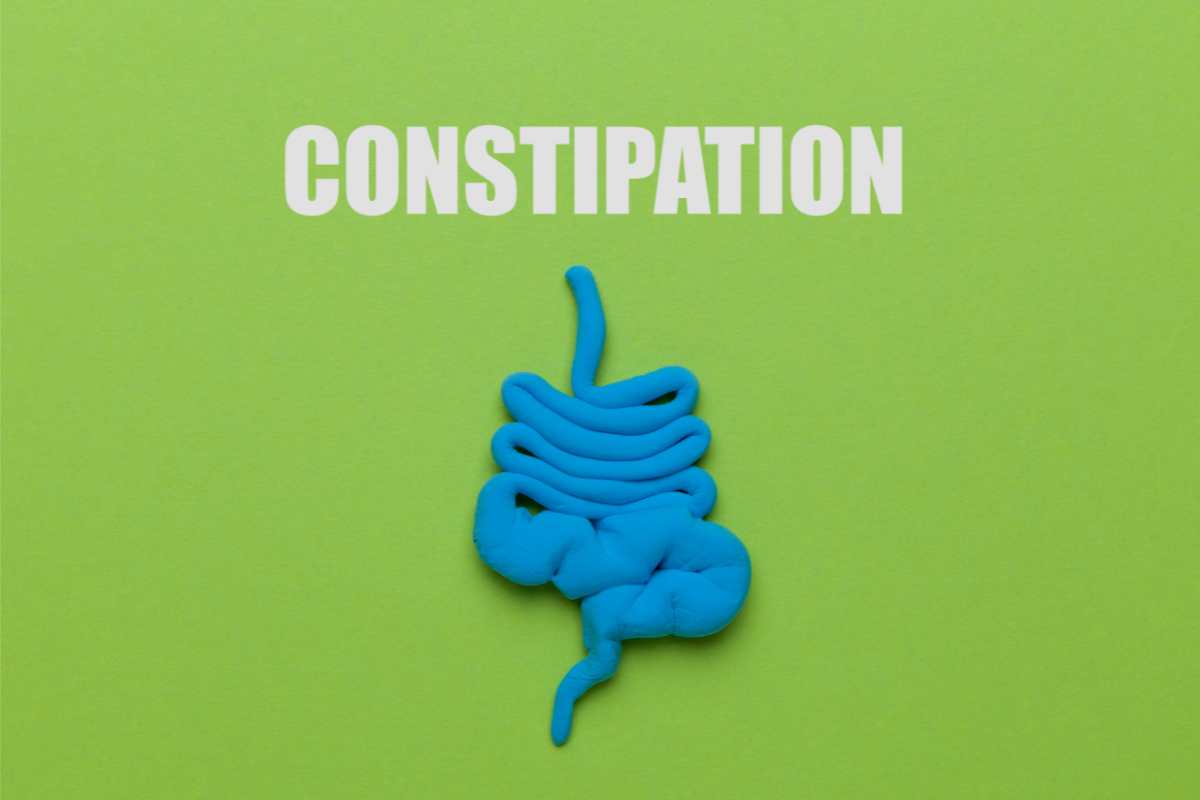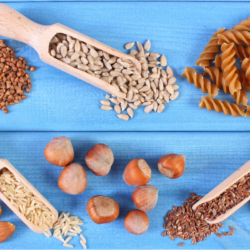Constipation is a common gastrointestinal disorder that affects quality of life and often requires therapeutic intervention. The aim of this article is to examine the natural laxative options available, highlighting their effectiveness and how to use them.
How do I know if I’m constipated?
Constipation is clinically defined as a significant decrease in the frequency of bowel movements, accompanied by difficulty in passing stools that are generally hard and dry. Medical criteria often specify less than three bowel movements per week, a criterion recognised by most gastroenterologists. Constipation is also characterised by a sensation of incomplete emptying, excessive effort during defecation, or a sensation of anal or rectal blockage. These symptoms must be present for at least three months to establish a definite diagnosis of chronic constipation.
The impact of constipation on quality of life can be considerable, affecting both the physical and emotional well-being of individuals. Physically, constipation can cause abdominal pain, bloating and even more serious complications such as haemorrhoids, anal fissures and, in extreme cases, bowel obstruction. These symptoms can hamper daily activities, reducing people’s mobility and energy.
Emotionally, chronic constipation is often associated with increased stress, anxiety and depression. Continued discomfort and embarrassment can lead to lowered self-esteem and negative repercussions on the social and professional lives of those affected. In addition, managing constipation often involves dietary and lifestyle changes, which can be perceived as restrictive and frustrating for many.
Effective management of constipation, particularly through the use of natural laxatives, therefore represents a major challenge in improving not only gastrointestinal health but also patients’ overall quality of life.
What is a natural laxative?
A natural laxative is any substance of natural origin used to facilitate intestinal transit and stool evacuation. These substances can include fibre-rich foods, certain herbs and other organic compounds that stimulate intestinal movement or increase the volume of stools by absorbing water. Unlike synthetic laxatives, natural laxatives tend to have a gentler, less abrupt action, favouring a process closer to the body’s natural defecation mechanism.
The most common types of natural laxatives include dietary fibres, such as those found in flaxseed or psyllium, sorbitol-rich fruits such as prunes and figs, and laxative herbs such as senna or rhubarb. These products are often recommended not only for their effectiveness as a treatment for constipation, but also for their ability to be incorporated beneficially into the daily diet.
Do natural laxatives really work?
Natural laxatives work mainly by modulating intestinal transit in several ways. Firstly, fibre-based laxatives, such as psyllium or linseed, absorb water in the intestine, which increases the volume of stools and stimulates natural intestinal contractions. This mechanical action facilitates the passage of stools and reduces intestinal transit time, thus preventing constipation.
On the other hand, certain natural laxatives, such as aloe or senna, contain stimulating compounds that directly activate intestinal motricity. These substances speed up the peristaltic movements of the colon, helping to evacuate bodily waste more quickly and effectively.
Natural laxatives improve intestinal flora
In addition to their effect on transit, natural laxatives can also help improve intestinal flora. Dietary fibre serves as a substrate for the beneficial bacteria in the colon, supporting the growth of a healthy microbiota. This symbiotic relationship between fibre and intestinal flora is essential for overall digestive health, helping to produce anti-inflammatory compounds and protect against pathogens.
What are the benefits of natural laxatives?
Using natural laxatives has a number of significant advantages over drug treatments. The main advantage is that they have fewer side effects. Unlike synthetic laxatives, which can lead to cramps, long-term dependence or disruption of electrolyte balance, natural laxatives offer a gentler, more balanced solution.
What’s more,improving overall digestion is a notable benefit of natural laxatives. By regulating intestinal transit and enriching the intestinal flora, these natural products contribute to a better metabolism and better absorption of nutrients. They also help prevent more serious digestive disorders, such as irritable bowel syndrome or certain forms of colorectal cancer.
Several scientific studies have highlighted the effectiveness of natural laxatives in managing constipation, illustrating their therapeutic potential. For example, research published in the Journal of Ethnopharmacology showed that prunes were more effective than psyllium in improving stool frequency in people suffering from mild constipation. Prunes, which are rich in fibre and sorbitol, a sugar alcohol with hygroscopic properties, help to hydrate stools and stimulate intestinal transit.
In addition, a study conducted by the American Journal of Clinical Nutrition found that including psyllium in the daily diet not only helped to regulate the frequency of bowel movements but also improved the overall consistency of the stools, thereby reducing the effort involved in defecation. Psyllium, which acts by increasing stool volume and facilitating stool passage thanks to its soluble fibre content, is a key example of how natural laxatives can be used effectively in the management of chronic constipation.
What are the best natural food laxatives?
Prunes
Prunes are widely recognised for their laxative properties, mainly due to their high fibre content and sorbitol, a sugar alcohol that has a natural osmotic effect in the intestine. A study published in ‘Alimentary Pharmacology & Therapeutics’ showed that regular consumption of prunes can significantly improve stool frequency in people suffering from chronic constipation. Prunes not only facilitate stool hydration but also stimulate intestinal peristalsis, contributing to more regular and less painful bowel movements.
Figs
Figs are another rich source of fibre and natural compounds that promote digestive health. They contain soluble and insoluble fibres that help normalise intestinal function. Figs also contain enzymes that can help improve digestion and facilitate evacuation. Their use as a mild laxative can be particularly useful for people seeking to avoid medication and maintain a more natural approach to managing constipation.
Kiwifruit
Not only are kiwis rich in vitamin C and antioxidants, they are also an excellent source of dietary fibre. An Asian study found that daily consumption of kiwifruit helped to improve constipation symptoms without causing bloating, which is often associated with other forms of fibre. Kiwifruit contain an enzyme called actinidin, which can help speed up protein digestion and facilitate intestinal movement.
Flax seeds
Flaxseeds are a superfood when it comes to intestinal health, thanks to their high content of soluble and insoluble fibre. They work by absorbing water and forming a viscous gel that facilitates stool passage and helps maintain intestinal regularity. What’s more, flaxseed is good for cardiovascular health, making it an excellent choice for a healthy, balanced diet.
Aloe vera
Aloe vera is traditionally used for its healing and soothing properties, but it also serves as a natural laxative. Aloe vera gel contains anthraquinones, compounds that encourage water activity in the colon and stimulate intestinal contractions. However, aloe vera should be used with caution, as large quantities can cause cramps and loss of electrolytes.
By incorporating these food laxatives into the daily diet, individuals can not only improve their intestinal transit but also benefit from better overall digestive health. Each of these foods offers a natural and gentle method of treating constipation, enabling long-term management without the drawbacks of medicated laxatives.
The most effective natural herbal laxatives
Senna
Senna is a medicinal plant commonly used as a natural laxative. Its active ingredients, sennosides, stimulate the nerves in the colon, causing contractions that speed up intestinal transit. This action helps to relieve constipation quickly, but its use must be controlled as prolonged use can lead to dependence of the colon on these stimulants to initiate intestinal movements. Senna is often recommended for short-term use, particularly in cases of severe constipation.
Psyllium
Psyllium, derived from the hull of the seeds of Plantago ovata, is a mass-forming laxative. It absorbs water in the intestine, forming a thick gel that makes the stools bulkier and more flexible. This property facilitates their passage through the colon and is particularly effective in regulating intestinal transit over the long term. In addition to its laxative action, psyllium can help reduce cholesterol, offering additional cardiovascular benefits.
Cascara Sagrada
Cascara Sagrada is another plant traditionally used for its laxative effects. Like senna, it contains compounds that stimulate intestinal peristalsis. Historically used by the indigenous peoples of North America for its medicinal properties, Cascara Sagrada is effective in treating occasional constipation. However, it should be used with caution, as excessive use can lead to side effects such as electrolyte disturbances and muscle weakness.
Rhubarb
Rhubarb is used not only in cooking for its tangy stalks, but also in phytotherapy for its laxative properties. Rhubarb roots contain anthraquinones, similar to those found in aloe vera and Cascara Sagrada, which stimulate intestinal contractions and facilitate transit. In addition to its action on constipation, rhubarb can help improve the general health of the digestive system thanks to its antioxidant properties.
These herbal laxatives offer effective natural alternatives for the treatment of constipation. However, they should always be used under medical supervision, as they may interact with other medications and are not suitable for all patient profiles, particularly in cases of pregnancy, inflammatory bowel disease or other pre-existing health conditions. However, if used judiciously, they can be used to manage constipation naturally, minimising the risk of side effects associated with synthetic laxatives.
Natural laxatives available from online pharmacies
Lehning Vegetable Dragées Rex Regular Transit 60 capsules
Rex Regular Transit Vegetable Dragees by Lehning are a natural option to facilitate regular intestinal transit. This product contains a combination of plants such as psyllium, milk thistle, mallow and artichoke, known for their stimulating effect on transit. These capsules are particularly suitable for those looking for a gentle, natural solution to regulate their digestion without resorting to harsh chemicals.
Belloc Constipation Powder 250 g
Belloc Constipation Powder is formulated mainly with senna, renowned for its rapid effectiveness in treating occasional constipation. This powder can be mixed with water or dessert/compote to create a laxative solution that works by stimulating intestinal movements. It is ideal for people who need a quick fix, but still want to stick to natural products.
Yerbalaxa herbal tea 10 tea bags, Digestion, transit Iphym
Yerbalaxa is an herbal tea from Iphym specially designed to improve digestion and facilitate transit. It contains a blend of plants such as senna, mallow and borage, which help to relax the digestive system and naturally stimulate intestinal transit. This herbal tea is an excellent option for those who prefer a gentler, more gradual approach to managing constipation.
Sofinnov Transitum 120 Vegetable Capsules
Sofinnov Transitum offers a formula rich in fibre and probiotics to help maintain regular transit and healthy intestinal flora. This product combines flax fibre with cultures of beneficial bacteria, creating a favourable environment for efficient digestion. The capsules are 100% vegetarian, making them suitable for vegetarians and those who avoid animal products.
Phytoxil Transit 20 tablets
Phytoxil Transit tablets are designed to facilitate intestinal transit thanks to a composition based on laxative plants such as mallow. As well as stimulating transit, they help to regulate intestinal function over the long term. These tablets are a practical choice for those looking for a natural yet effective solution to constipation.
These products are available from online pharmacies and offer various options for managing constipation naturally with herbal ingredients. They illustrate how herbal medicine can be effectively integrated into the treatment of digestive problems, providing an alternative to more invasive or chemically synthesised treatments. However, it is advisable to consult a health professional before starting any treatment, especially if you have pre-existing medical conditions or are taking other medications at the same time.
Sources
- Aging (Albany NY). 2021 Jun 15; The effects of psyllium husk on gut microbiota composition and function in chronically constipated women of reproductive age using 16S rRNA gene sequencing analysis
- Aliment Pharmacol Ther. 2011 Apr Randomised clinical trial: dried plums (prunes) vs. psyllium for constipation





